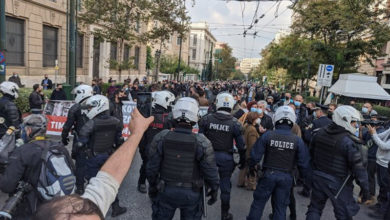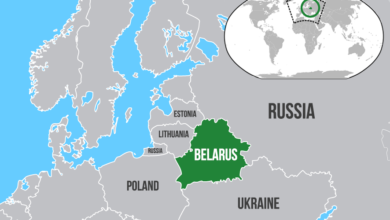On Aug. 14, the Greek parliament delivered a final vote of approval to the brutal new austerity memorandum imposed on the country by German-led creditor states and is now poised to meet the crucial August 20 deadline for a large payment to the European Central Bank. Contrary to their campaign trail promises, the Coalition of the Radical Left (SYRIZA)-led government of Prime Minister Alexis Tsipras has agreed to another bailout package. While Tsipras remains popular overall, this move has provoked major demonstrations and about 30 percent of SYRIZA members of parliament either voted against the new measures or abstained.
In return for just under $100 billion, Greece will have to make it harder to retire, implement regressive taxes, surrender public assets to a third party that will preside over their privatization and take other steps to decimate the rights of poor and working people. This money will not be spent “saving the country,” as pro-austerity politicians put it, but will be spent either bailing out Greek banks or paying the government’s debts to international big banks and financial institutions.
The dramatic events that have unfolded over the course of this year, from SYRIZA’s election victory in January, its initial capitulation in February, the brinksmanship earlier in the summer and now its begrudging assent to yet another memorandum, have brought the Eurozone to the verge of collapse. While the situation is comparatively calmer now than it was several weeks ago, this is by no means a definitive end to the crisis in Greece and Europe.
IMF role uncertain
The German parliament voted overwhelmingly to approve the new memorandum on August 19. While this result was never in doubt, the number of legislators form Chancellor Angela Merkel’s right-wing Christian Democratic Union who voted against the proposal was being closely watched as a barometer of the German ruling class’ attitude towards the Eurozone crisis. Ultimately, 63 out of 311 voted no and three abstained, not much different from the 60 no’s and five abstentions during the last major vote.
A significant section of European capital now appears convinced that a fundamental overhaul of the project of European integration is necessary for the process to continue. This is not the majority position, but the extreme hard line taken by some representatives of the wealthier northern European states—personified by German Finance Minister Wolfgang Schaeuble—indicates their lack of confidence in the existing model. In their view, the best way to avoid the problems stemming from uneven economic development across the Eurozone, especially those related to access to credit, is for the more powerful countries to ditch the periphery and move more rapidly towards fiscal integration.
These right-wing forces in Germany are now saying that they will not support the latest bailout unless the International Monetary Fund is involved. However, the IMF has announced that it believes Greece’s debt is unsustainable. It will not contribute any additional money to a bailout unless part of the country’s debt is forgiven by its creditors.
It is odd, then, that the trend supporting a Greek expulsion is demanding IMF involvement, since they are also the most hysterically against any talk of debt relief for Greece. Having another partner involved in the bailout to spread the risk around and reduce the burden on Germany would certainly be attractive to the ultra-hardliners in and of itself. However, concurrently calling for IMF involvement and rejecting the IMF’s main condition for involvement is in keeping with the strategy that these same forces pursued during the negotiations—make impossible demands and hope the clock runs out.
The rift in SYRIZA deepens
A record number of SYRIZA members of parliament refused to back the government in this latest bailout vote, compared with the other votes taken in prior stages of the approval process. Thirty-two voted no, 11 abstained and one was absent, out of a total of 149 SYRIZA lawmakers. If all the parliamentarians who voted no were counted as a separate bloc, they would constitute the third largest force in the legislature, which includes seven parties.
In the tense days leading up to the July 20 debt payment to the European Central Bank, the leadership of SYRIZA was faced with a choice—relent and impose the austerity they were elected to end, or prepare to default and exit the Eurozone. This was an entirely predictable scenario, but one that Prime Minister Tsipras had repeatedly assured would not occur. They could not keep their promise to reverse austerity as well as keep the Euro, and in the end the leadership chose the latter.
A faction of SYRIZA, primarily the Left Platform led by former Energy Minister Panagiotis Lafazanis, has bitterly opposed this decision and first abstained then voted against the new memorandum in parliament. The Left Platform has been gaining influence in the party’s governing bodies—a slim majority of central committee members signed a document opposing the new bailout. However, due to the huge influx of new SYRIZA members in recent years and months, they are weaker at the grassroots level, and there has yet to be an opinion poll released measuring the electoral strength of a hypothetical breakaway group.
It increasingly appears to be only a matter of time before a formal split takes place. On July 17, the Left Platform ministers were expelled from the cabinet and replaced by figures close to the leadership. Tsipras is however constitutionally unable to remove Speaker of Parliament Zoe Constantopoulou, who has been able to put up procedural roadblocks to his austerity agenda.
On August 13, Lafazanis issued a joint statement with 13 other SYRIZA leaders calling “for the creation of a nationwide movement, by establishing committees against the new Memorandum, austerity and the country’s new guardianship. A unitary movement that will fulfill the aspirations of people for democracy and social justice.” This is envisioned as an extra-parliamentary organization for struggle in the streets, but it is still a clear indication that the Left Platform is leaning towards the creation of a new political formation as well. Meanwhile, revelations from former Finance Minister Yanis Varoufakis about contingency planning for a new currency undermines Tispras’ line that there was no alternative to submitting to a new memorandum.
SYRIZA’s central committee has called a party congress to address the growing factional rift, to be held in September. Because it will be an extraordinary congress rather than an ordinary congress, new delegates will be elected as opposed to convening the delegates elected for the last congress (held in July 2013). This is favorable to the party leadership, since the meteoric rise of SYRIZA has meant that most of its membership is new to the organization, has less experience both theoretically and in terms of practical politics, and is more likely to have been attracted to the party out of support for the personality of Alexis Tsipras. This vulnerability to ideological dilution is a key weakness of a mass party and is why revolutionaries throughout history have preferred the Leninist organizational form based on cadre.
Left effectively without a parliamentary majority, the government is likely to call early elections before the end of the year. Tsipras has not directly stated his intention, but government ministers close to him have explicitly endorsed such a move. This may take place in the immediate future, or after October to allow the government to pass the first financial inspection by its creditors under the new bailout regime.
Progressive and revolutionary forces in Greece are in a state of flux, grappling with how to respond to this year’s complex developments. The Communist Party of Greece (KKE) called on its supporters to spoil their ballot in the dramatic July 5 vote, refusing to join the dynamic and ultimately victorious “no” campaign out of blanket opposition to any unity with SYRIZA, even with its base. It is worth noting that the KKE has seen no discernable increase in support, either in opinion polls or in the streets, since Tsipras’ capitulation.
The massive mobilizations sparked by the referendum and the people’s definitive “no” to austerity shows the energy that exists in opposition to the new memorandum. Crucial events on the horizon will help determine if an organizational vehicle will emerge capable of giving political direction to this mass desire to resist.






